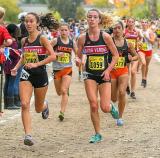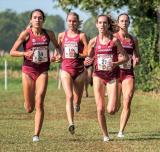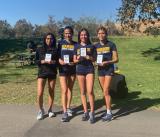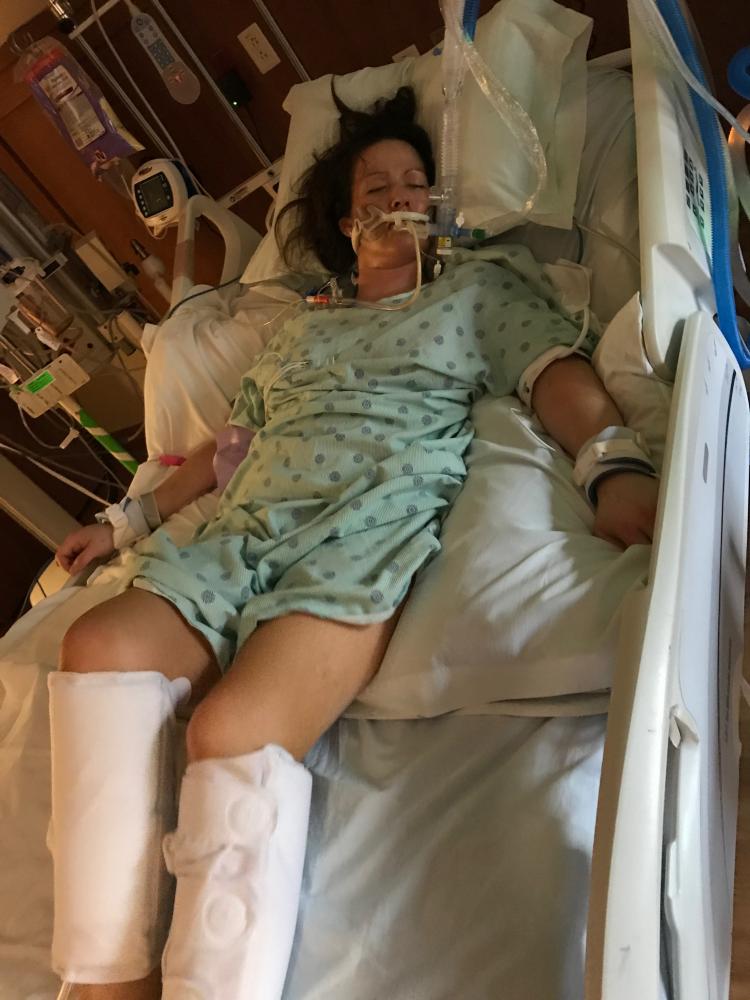Folders |
L.A. Harbor College's 44-Year-Old Freshman Aleta Fields Has Overcome Ravages Of A 20-Year Drug Addiction To Reach CCCAA State FinalPublished by
I Can. I Will. I Must. L.A. Harbor Coach Geoff Skarr Calls 44-Year-Old Freshman Aleta Fields, 'A Walking Miracle' A DyeStat Story by Alex Valladares _____ I can, I will, I must. It is a mantra freshman Aleta Fields repeats to herself when she runs with the Los Angeles Harbor College women’s cross country team. During each workout and every race this season, it is a recurring phrase the 44-year-old mother of two children and grandmother of twin boys summons as a source of inspiration to reach her desired destination. “I have always loved running,” Fields said. “It means a lot to me. I have a hard time not running. It’s very therapeutic. It helps me clear my head.” When Fields arrived with an open mind at L.A. Harbor during the summer, she was 26 years removed from graduating Olympic High in Bremerton, Wash. The Seahawks, the defending California Community College Athletic Association women’s state champions, boast a roster full of teenage athletes who were recruited out of high school and boast significant cross country experience. Fields wasn’t recruited, had never competed in a race and the concept of being on a team at any level was a foreign one to the resident of Garden Grove, Calif. But it was an idea Fields was eventually convinced to try after being randomly discovered in a health and fitness class by L.A. Harbor cross country coach Geoff Skarr. “I went out to a class that was running a little bit of a time trial on the track during a summer health and fitness (section) and she was the one that stood out,” Skarr said. “You could tell she had some really good form.” Little did Fields know at the time that just a few months later she would develop into a consistent scoring runner for the Seahawks, who are competing Saturday at the CCCAA state championship meet at Woodward Park in Fresno, Calif. That six-word personal mission statement – I can, I will, I must – reflects a relentless will and unwavering determination for an athlete competing against women less than half her age. But it also refers to much more than that. It is a message of survival. In the last two-and-a-half years, Fields has overcome two decades worth of drug addiction, an abusive relationship, two medically induced comas and an attempted suicide. Her story is one of perseverance, despite facing some of the most dire circumstances imaginable, and a testament to an unbreakable spirit. “I never thought I would be doing this,” Fields said. “It means the world to me.”
A Nerve-Racking, But Satisfying Challenge When Fields was initially approached about joining the women’s cross country team by Skarr, she thought he was joking. “I thought to myself that he couldn’t be serious,” said Fields, who did not participate in any athletics while attending high school in Washington. “I had never run competitively or even a fun run. But I have always loved running.” But what Skarr saw was raw, coachable talent that could help bolster the women’s roster. “The running seemed easy to her,” Skarr said. “When she finished, I walked over to her and asked her if she was interested in joining the team.” He was met with skepticism on Fields’ behalf, but he assured her joining the team was no joke – even with no prior competitive racing experience. “That’s what’s funny because that was the misinterpretation,” Skarr said. “I thought she had run in high school, so I felt she did know racing. As we got to know each other more, she confirmed that she had not raced in high school.” After contemplating joining the team, Fields discussed it with family. Her decision was met with resounding enthusiasm and support. “I thought it was badass,” said Azhia Quade, Fields’ 23-year old daughter. “Here is this middle-aged woman who was just running for fun and for herself and then she ends up being one of the top runners on her team. It’s crazy.” Any doubts Fields might have had about being part of the team were put to rest after attending her first practice during the summer. “The first practice I attended was a core workout,” Fields recalled. “By the time we started running, my legs felt like Jell-O. We ran a seven-and-a-half-minute pace that day. I kept thinking, ‘I’m 44 years old, what am I doing trying to keep up with a bunch of 18-year olds?’ But I did it. My legs were super sore the next day. It was a challenge, but a very satisfying challenge.” Being able to keep up with runners 25 years younger than her was just one of the challenges Skarr knew Fields would face as she had no prior training or racing experience. “Everything is new to her, every race, every training interval we do, it’s all new to her,” Skarr said. “That’s what’s amazing. It’s so brand new. Normally, it’s not something you come across, but once I realized she could jump right in, we just treated her like all the other girls, no matter what age we are.” While exceeding expectations at practice, Fields was eager to run her first collegiate race and that day came Aug. 29 at the Redlands Invitational. “The first race was terrifying,” Fields said. “I had always run by myself. Everybody out there was two decades younger. I just wanted to finish and say I ran a collegiate race.” She did more than just finish. She placed 29th out 57 runners, covering the 4,500-meter course in 19 minutes, 40 seconds in the women’s open race. “Halfway through the race, my confidence kicked in,” Fields said. “I saw I wasn’t last and I was holding my own. At that point, it wasn’t scary anymore, it was fun. “After the race, I got emotional. I facetimed my son and daughter and told them I did it.” But it would not be the only time, as Fields would come through with a significant performance for L.A. Harbor later in the season, running her most inspired race at the South Coast Conference finals Nov. 1 at Irvine Regional Park. “Coach (Skarr) told me that the top 14 runners get medals at conference finals,” said Fields, who also clocked a season-best 20:19.4 in the 5-kilometer race Sept. 28 at The Master’s Invitational at Central Park in Santa Clarita. “I just wanted to place 14th and get one of those medals.” She did much more than just earn a medal as she placed sixth in 22:24.7 as the Seahawks’ No. 4 runner, earning all-conference honors and helping L.A. Harbor to its third consecutive title and second outright championship in program history. In the final 50 meters of the race, that familiar mantra – I can, I will, I must – could be heard audibly as Fields crossed the finish line. The same phrase Fields has used to motivate herself throughout the season was another example of the spirit that was nearly shattered two-and-a-half-years earlier. “She went above and beyond what I even predicted her to place that day,” Skarr said. “She did that and it helped us propel to a third straight conference championship in a row. I even gave her MVP of the meet that day.”
A 20-year Haze Adapting to small-town life can be a difficult process for anyone who has lived most of their life in a big city. It was the same for Fields as she moved with her husband, Kevin Quade, from Seattle to Wibaux, Montana – a town with a population of less than 600 – that is 10 miles west of the North Dakota border to become co-owners of a local bar. “I had never been to a town that small in my life,” Fields said. “My graduating class in high school had more people in it than lived in Wibaux.” Little did Fields know moving to this small town would be the beginning of the darkest chapter of her life. A chapter that nearly cost her everything she held dear on more than one occasion. “Living in a small town was just like a big haze,” Fields said. “A big nightmarish haze that continued for 20 years.” It was shortly after the birth of her son in April 1997 that Fields experimented with drugs for the first time in her life in an effort to lose 70 pounds she gained during her pregnancy. She was introduced to Methamphetamines – commonly referred to as “Meth” – by her husband at the time. “He set a line for me at the table and I just sat and stared at it for an hour,” Fields said. “I had never snorted anything or anything like that. I had tried (marijuana) in high school once but that was it. I never used any kind of drugs up until that point.” It would be the beginning of a two-decade long addiction to Meth that would put her on the brink of death. At first it was recreational use, but eventually spiraled out of control to the point it took control of her life. “The last five years, I used practically every day,” Fields said. “I progressed to snorting it to smoking it to ‘hot railing’ to ‘slamming’ it.” “Hot Railing” is a form of vaporizing meth in order to inhale it for greater effect and “Slamming” mean injecting it straight into the bloodstream with a syringe. After divorcing her husband in 2003, Fields began an on-again, off-again relationship with “Roy” – a local of Wibaux whose real identity she chose not to reveal – who also was a Meth user and was physically abusive during a 12-year span of the relationship. “When you’re in a small town, it’s hard to get out of that cycle,” Fields said. “All of my family was away. I had my kids there, but it’s not like I could have gone to them for support. All of a sudden you look around and all your friends are all users also.” While still married, Fields checked into a rehabilitation facility on two occasions in order to kick her addiction. Or so it seemed. “I had no intention of quitting. I went so I didn’t have to hear my husband complain about it,” she said. Even without the two rehab stints, Fields tried to walk away from the drug use, but found it more difficult than she imagined. “I tried to stop because it wasn’t ‘fun’ anymore. It had lost its luster. Things went sideways. Roy was kicking my ass and it wasn’t fun anymore,” Fields said. “I didn’t actively go looking for it, but it was difficult when your ‘friends’ come over. I had a hard time turning it down back then. “For me, it was more psychological than physical. It became more psychological because you’re always so tired. Your whole day is centered of chasing that high. One time, I was awake for five straight days with no sleep. That was insanity. Absolute insanity. Then I would pass out for two to two-and-a-half days straight, wake up and do it all over again.” There seemed to be no end to the spiraling cycle. Eventually, Fields found herself selling drugs to support her addiction. “It’s weird when you start using and then start selling to cover your usage. It’s a big, dark vicious cycle that is so hard to get out of. When you’re surrounded by it and all your friends use, it’s hard to break from that,” Fields said. “They tell you in treatment that you have to change your social circle. That is a huge part. It’s a huge factor.” With her addiction consuming her and no support system around her, Fields saw no other alternative than to end her own life. “It all become too much for me,” she said. “I went home and called my sister to say ‘goodbye.’ I didn’t want to deal with any of it.”
Ten Days It all came to a head for Fields on Aug. 1, 2017 when she was found in the bedroom, unconscious and unresponsive by Roy, who had just come home. An asthma attack, compounded by two decades of drug abuse had finally caught up to her and put Fields on the brink for the next 10 days. Fields was taken to Glenville Medical Center, where she briefly stabilized. But things took a turn for the worse and she was airlifted to Billings Medical Clinic in Billings, Mont., and received a bone catheter – known as Intraosseous Infusion – a procedure to get critical fluids and medication into the cardiovascular system accessing the venous system through the bone marrow. The decision was made to put Fields in a medically induced coma in the hopes of saving her life. Five days later, Fields’ older sister Leana Tsue arrived to Billings to help care for her. What Tsue witnessed was a scenario that no sibling ever wishes to experience. “When you see someone you love in a state of hopelessness, it’s very sad and painful,” Tsue said. “My hope was that she would pull through and my hope came true.” Fields awoke Aug. 10 from her coma, doing so for the second time in her life. She had previously been placed in medically induced coma for three days in 2004 due to a severe asthma attack. But unlike the previous experience, Fields did not emerge from this one unscathed. “The first time I was in a coma, the doctors were able to help me enough that I checked out and went home to use Meth that very night,” Fields said. “It was insane. But when you’re chasing that high, nothing matters besides getting more Meth to use.” The situation was a lot more serious this time around and after emerging from the coma, a long road to recovery was ahead of Fields. It began with coming clean to her kids about her years of drug abuse, a fact she kept hidden for 20 years. “I think they suspected, but everything came out at the hospital – everything,” Fields said. “The kids finally knew and my sister finally had it confirmed.” Azhia Quade found herself with mixed emotions as he had already lost her father, Kevin, who died of a heart attack in October 2007. “We were very sad,” Azhia said. “Besides that, we were more disappointed than anything. We just wanted her to take care of herself. We already lost our dad and we didn’t want to lose our mom, too.” Fields’ condition was further complicated as she was diagnosed with Takotsubo Cardiomyopathy – a condition more commonly referred to as “Broken Heart Syndrome.” According to the American Heart Association, “Broken Heart Syndrome” is when a part of the heart temporarily enlarges and doesn’t pump blood well, while the rest of your heart functions normally or with even more forceful contractions. Her family urged her to make the move with Tsue to California to escape from the vicious cycle she had repeatedly found herself a part of. And Fields was hesitant, at first, about moving to a state she had never been to. “I was like, ‘I don’t know about moving to California,’” Fields said. “I didn’t know what I was going to do down here. And to have to live with somebody else when you’re a grown woman.” But a hospital visit and an emotional plea from her son, Jhet Quade, would prove to be the necessary motivation to make the move to the West Coast, a decision that would ultimately save her life. “He came to visit and made me promise to move and get away from Roy and that lifestyle,” Fields said. “I saw the look the look on his face. There was so much hurt and disappointment. “I never want to see the look on my son’s face again. I never want to see that again. You never want to see that kind of hurt on a child’s face knowing that you’re the one that caused it by your choices. I promised him, I packed up and moved.” Fields moved to Garden Grove with her sister, the one person on which she could always rely. The one person who never left her side upon arriving at the hospital and kept watch over her. The one person who was there when she emerged from her coma. “When I came out of the coma, she was the first face and voice I remembered,” Fields said. “She never left the room while I was in the hospital. She slept in a cot. Literally did everything for me. She is the best person I know.” Just like she had done while Fields remained hospitalized in the days following waking up from the coma, Tsue had faith her baby sister would make a full recovery. “I have always wanted my sister to come to California with me,” Tsue said. “When all this happened, I knew it was prime time for her to make the move. My dream was for my sister to come live with me and my dream came true.” But the road to recovery was just beginning. In addition to the recurring asthma issues and the diagnosis of “Broken Heart Syndrome,” Fields also lost control of her motor skills. Fields struggled to walk or raise her arms past her shoulders. Simple tasks like brushing her teeth or getting up and walking to the kitchen proved to be very difficult. During the drive to California, Tsue had her sort coins to start getting her hand-eye coordination back. “Every time I brushed my teeth, I would end up with buckets of sweat,” recalls Fields. “It was so hard just to walk.” The determination and resolve that has made Fields an integral part of the L.A. Harbor team this fall began to be displayed. Fields slowly regained her motor skills and began walking around the neighborhood – one block at a time. It took Fields almost a year for her to be able to walk a full block. In time, more walking, ultimately, led to jogging. Fields’ health improved so drastically she was able to get off the medication she was taking, including blood pressure and heart medication. She eventually enrolled in general education classes at L.A. Harbor, including a health and fitness class that would ultimately open a door to joining the defending CCCAA state champions. Day 845 In 12-step programs, recovering addicts receive a button to commemorate reaching a certain number of days of sobriety. Fields doesn’t have any buttons or pins to celebrate her days of sobriety. She simply keeps track of them on her phone as the continuous reminder of the long and hard-fought journey that has shaped her life. When her phone reads Day 845, she’ll step to the starting line Saturday in Fresno with her teammates at the state finals at Woodward Park, just a little over two years after nearly losing her life. “There is such a great sense of satisfaction to run in college when I never even ran in high school and at this age,” Fields said. “I got to be the world’s oldest freshman on a cross country team. It’s wonderful. Everyone has been so supportive. I feel truly blessed.” With the darkest chapter behind her, Fields begins a whole new story filled with endless possibilities. Her journey continues to serve as encouragement to her family and teammates. “She’s truly an inspiration,” Jhet Quade said. “From going through all of the lowest lows that she’s experienced to going back to college and continuously trying to improve her life, she honestly just continues to impress me and make me proud.” At times during the season, Fields’ maternal instincts have kicked in and she finds herself giving advice to her younger teammates. “She talks to us about life outside of cross country,” said freshman teammate Marai Atanacio, who won the conference’s individual title. “She really inspires us with what she has done on the team and how she has turned her life around. It motivates us to be better.” After her first cross country season comes to an end, Fields plans on participating in her first “Fun Run,” as she plans to race in the Surf City Half Marathon in Huntington Beach in February 2020 with one of her professors, who is also a running enthusiast. Another first for Fields has also been achieved in the classroom, where she currently holds a 4.0 grade-point average. “I barely graduated high school and now I have a 4.0 GPA,” Fields said. “I know I have accomplished a lot, but there is so much more.” Fields will continue to take general education courses at L.A. Harbor next semester and possibly transfer to a school that offers classes in her major, with the goal of becoming a Neuro Diagnostic Technician. Fields also plans on competing in track for the first time during the spring for West L.A. College – since L.A. Harbor doesn’t boast a track and field program – and then return to the Seahawks cross country team for her sophomore season next fall. “I am sometimes at a loss for words,” Skarr said. “I continue to believe and know she is a walking miracle. I just appreciate how she landed into our Harbor family. I know it’s one of those God shots that just came to us. It’s really made it a blessing.” In addition to taking control of her health, being part of a team and continuing her education, Fields received another blessing Aug. 22 when she became a grandmother. Her daughter, Azhia, gave birth to healthy identical twin boys. “It’s an amazing feeling,” Fields said. “I get to see what a wonderful mother my daughter is and I feel so proud and so thankful to be able to experience it.” When she returned to Montana for the first time in two years to visit her daughter and see her newborn grandchildren, the possibility of a relapse still existed. But having come so far, Fields wasn’t going to let all of her hard work, dedication and positive life changes go to waste. “I wasn’t worried, but at the same time I took preventative measures to make sure I wouldn’t relapse,” Fields said. “I didn’t visit any ‘friends’ that were users and I ran every day. That was the tough part because it was 38 degrees.” She continues to maintain the promise to herself to live a clean lifestyle, staying true to the mantra she repeats every day during the season – I can, I will, I must. Fields continues to make believers out of anyone she meets as they watch her story unfold. “I want to know when she writes her book because I will be the first one to buy it,” Skarr said. “I think she’s got such a beautiful story. We really want to see her accomplish her goals and her certification programs and the unique career she wants to go into. I hope she does all of it. We will be there for her just as much as she has been there for us.” In the meantime, Fields is enjoying making up for lost time and just, “running with it” – pun intended. “I am truly, truly blessed to have a second chance to do what I should have done a long time ago,” Fields said. “Like sobriety, it’s one step at a time. You keep moving forward and if you happen to stumble and fall down, you pick yourself back up and continue to move forward. I am happy to think that when I hang up my running shoes, I can say – I can, I must, I did.” More news
1 comment(s)
|














